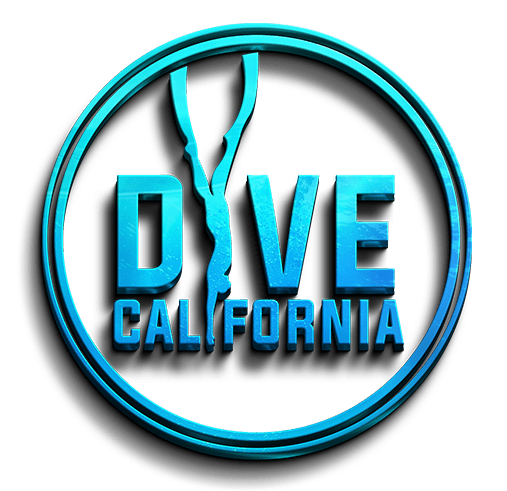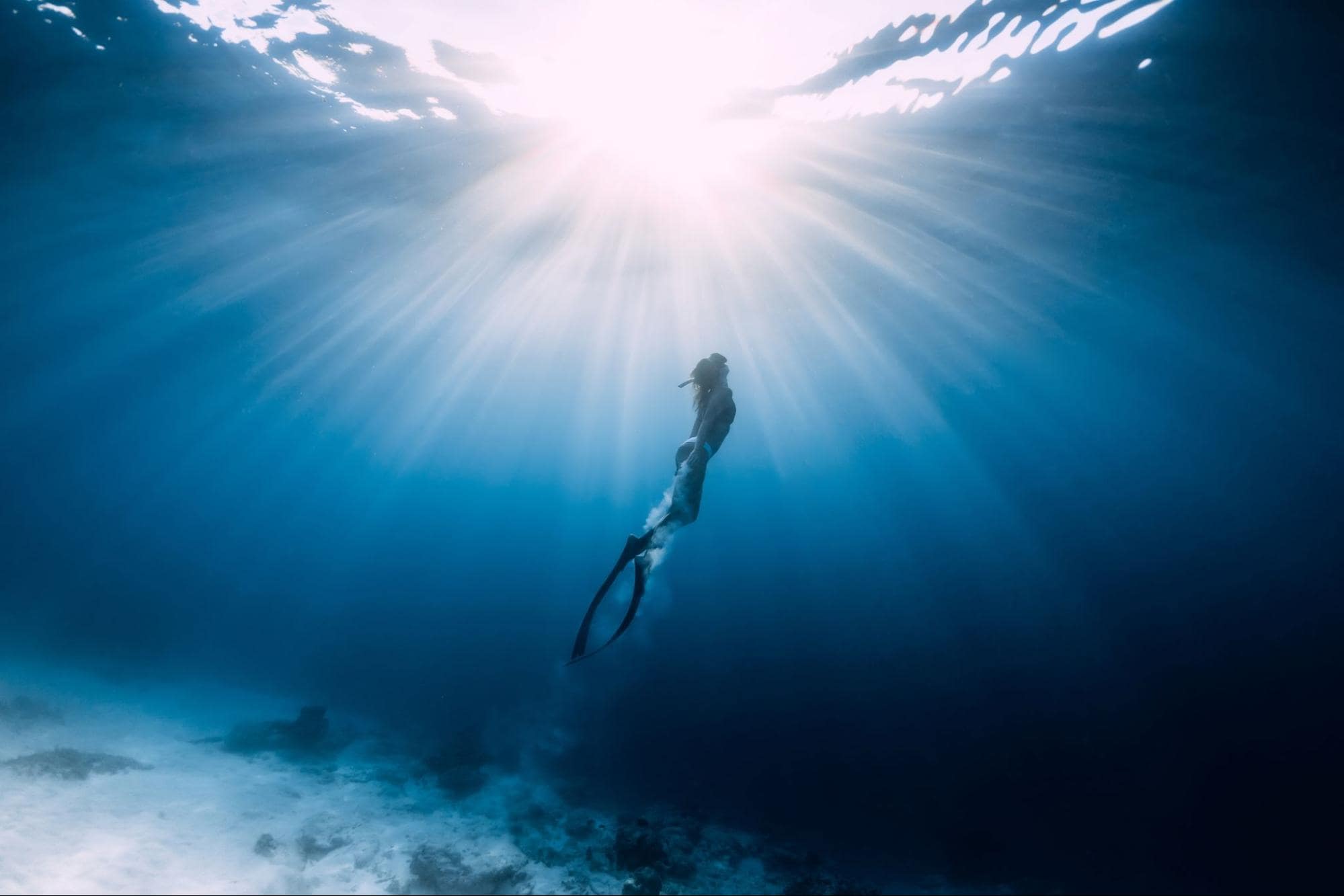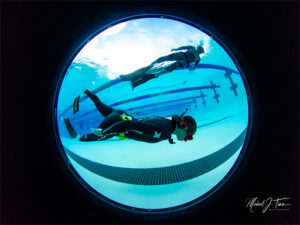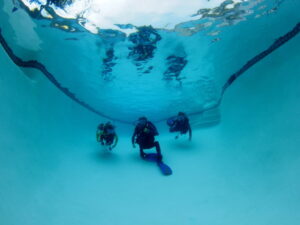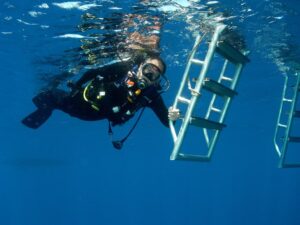Comparing Scuba vs. Freediving: Which One is Right for You?
There’s no better way to explore the marine world than to slip on a pair fins and go diving. Diving allows you to experience the ocean (and also rivers and lakes!) from the point of view of the animals that live in them.
The two main types of diving are scuba diving and freediving. Both are extremely fun, and they’ll each provide you with their own unique underwater experiences.
Many divers learn how to do both scuba diving and freediving, so it’s not like you have to choose between one or the other. However, most divers tend to gravitate toward one or the other.
Why might some people prefer scuba diving, while others favor freediving?
Let’s compare scuba vs. freediving. We’ll explain the differences between each water sport, and break down the pros and cons of each.
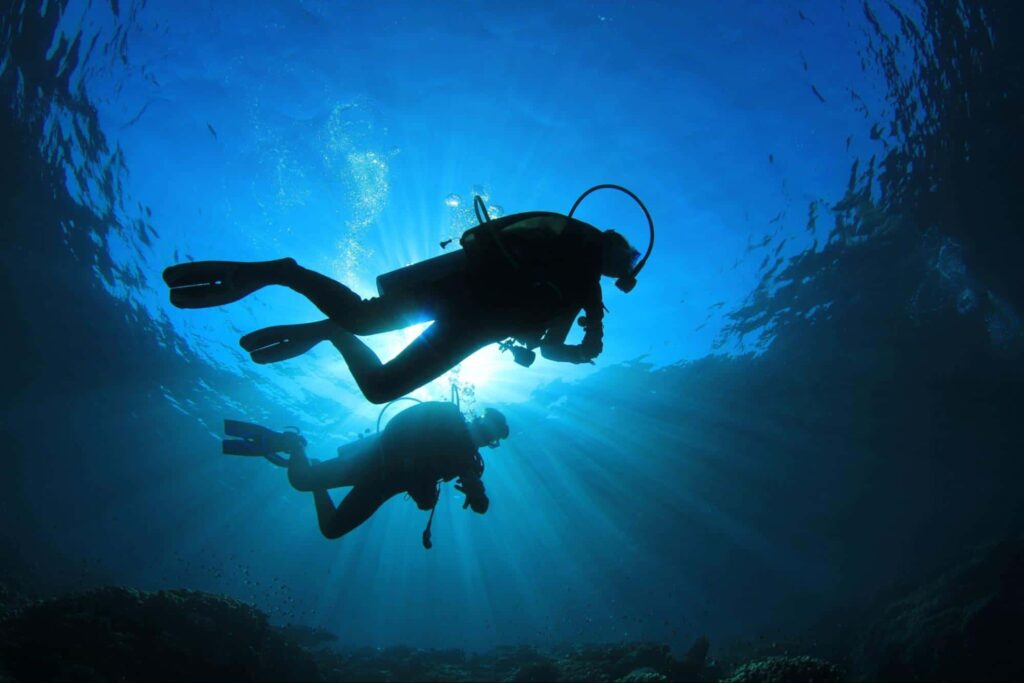
What’s the Difference Between Scuba Diving and Freediving?
So what’s the difference between scuba diving and freediving?
- Scuba Diving: You constantly breathe air that’s supplied by a metal cylinder, and you stay underwater until your cylinder runs low on air. You don’t hold your breath at all.
- Freediving: You make each dive on a single breath hold. You hold your breath when you go underwater, and return to the surface to do it again.
In scuba diving, you’re using SCUBA (self-contained underwater breathing apparatus) gear to breathe underwater.
In freediving, the main apparatus is your lungs. While most freedivers wear some manufactured gear (i.e. fins and mask), you can technically go freediving in nothing but your birthday suit. No equipment necessary.
Think about it this way: scuba diving is more about managing your gear, while freediving is more about managing your body and mind.
Underwater Experience: Scuba vs. Freediving
When you go scuba diving, you’re going to be underwater for a longer period of time without resurfacing. Most recreational dives last about 50 minutes. That means you’ll be underwater for nearly an hour, and then you’ll come back to the surface and switch out your cylinders so you can do it again.
When you go freediving, you’ll be underwater for however long you can hold your breath. Beginning freedivers are trained to hold their breath for 60 to 90 seconds, while advanced freedivers can hold their breath for 2 minutes or more.
Scuba divers will swim along a planned route (you’re either following a guide/divemaster, or you chart your own course before you get into the water). There’s little deviation from the route, but you can stop or slow down to inspect corals or watch animal interactions.
As a freediver, you’ll begin your dive by “scouting” areas you’d like to explore. You’ll swim down to the bottom of the dive site and try to locate something interesting–maybe a structure or an animal hideout. Once discovered, you’ll dive down repeatedly to enjoy what you’ve found until you’re ready to go find a new area.
Freedivers have a little more flexibility in where they go, and how long they choose to explore any one area.
But freedivers may find it harder to observe wildlife. For instance, you might discover an octopus that’s out hunting for food–but you have to leave it behind so you can resurface for air. By the time you get back down to the bottom, the octopus has already swam away and you can no longer find it. Scuba divers won’t have this problem. They have a steady supply for air, so they can hang around and relish these types of discoveries.
However, freedivers can be out in the water for a longer amount of time than scuba divers.
Scuba divers are limited by gas buildup in their tissues, which becomes dangerous after a certain level. Recreational divers typically only do 2 dives per day, and rarely more than 4.
But if you’re a freediver, you could theoretically spend all day exploring a dive site, taking a shore break every now and then to rest and re-energize before heading back out into the water.
Scuba vs. Freediving: Physical Requirements
Freediving tends to be more physically demanding than scuba diving.
Scuba gear is heavy, but once you jump off the boat, you have to do little else besides kicking. Most of the time, scuba divers are just floating in neutral buoyancy, giving light kicks to coast along the dive site.
In freediving, you’ll be doing a lot more swimming, and you’ll have to manage your muscles, movement, and air consumption.
Both water sports require a decent level of physical fitness. A smoking habit is out of the question if you want to be a diver. Exercise, healthy eating, and ample sleep will better equip your body to handle the enormous physiological changes brought upon you by the ocean.
Let the beauty of the ocean motivate you to develop better lifestyle habits!
How is Scuba Gear Different from Freediving Gear?
Scuba divers wear a lot more gear than freedivers. Their equipment includes BCDs, regulators, and weights.
But there’s some equipment overlap.
Both scuba divers and freedivers wear masks, fins, and wetsuits. However, these pieces of equipment are made differently for scuba and freediving.
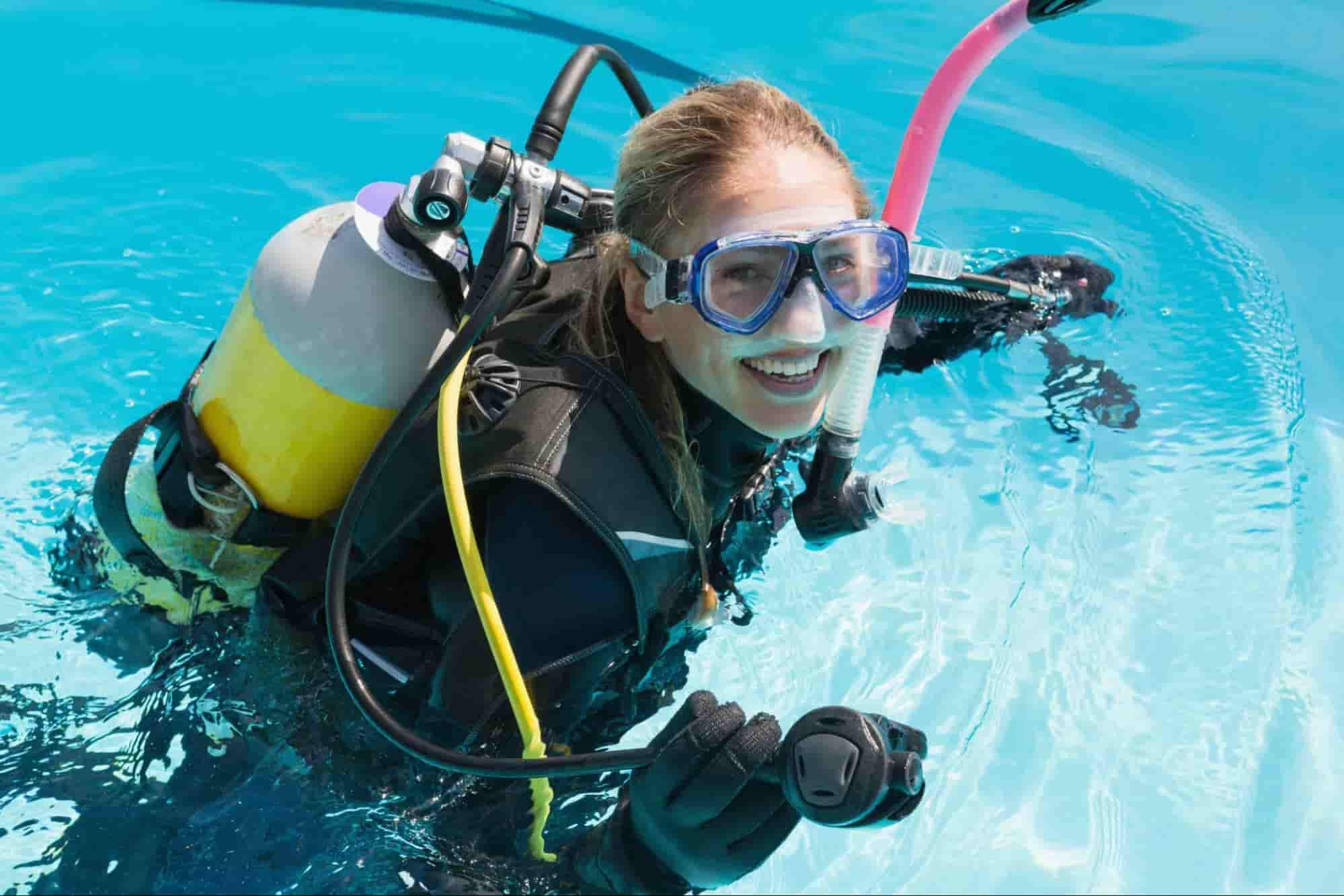
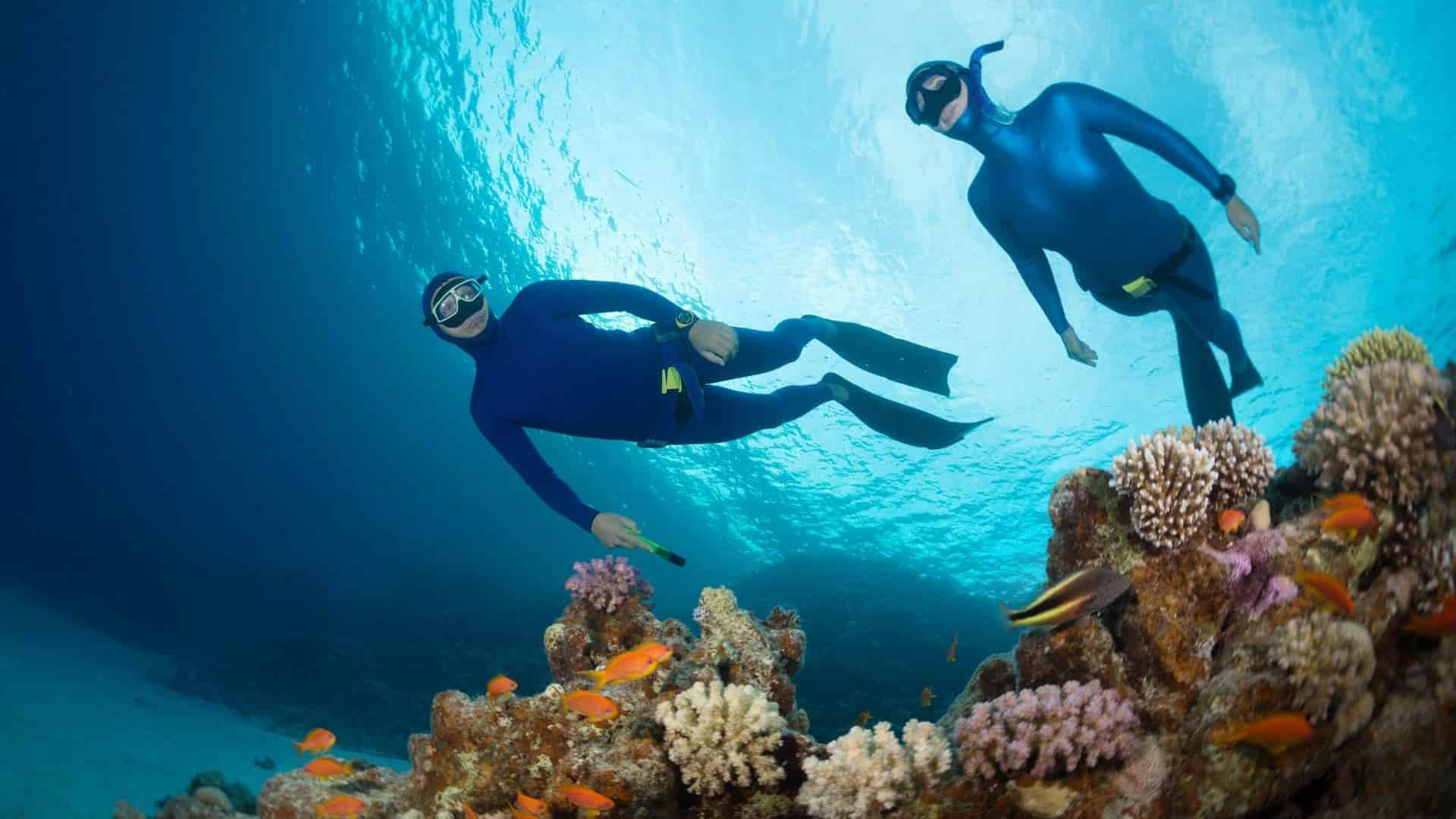
Scuba Mask vs. Freediving Mask
- Scuba Masks: Scuba masks are larger and heavier, and provide more visibility underwater so you don’t get tunnel vision.
- Freediving Masks: Freediving masks are smaller and wider. They don’t leave as much air space between the glass and your face, so you don’t have to spend as much energy equalizing or clearing your mask—which improves your rate of oxygen consumption.
Scuba Fins vs. Freediving Fins
- Scuba Fins: Scuba fins come in a wide variety of styles. Each style is suited for a different kind of marine environment. Some fins are built for power and movement, while others are designed for energy conservation. Generally speaking, scuba fins are shorter and stockier than their freediving counterparts.
- Freediving Fins: Freediving fins are easily recognizable for their long length and slender shape. These fins are designed to help you move a long distance with a single kick. The bi-fins are the most common type of freediving fins, but monofins also called “mermaid fins” are becoming popular with divers who have Atlantean ambitions!
Scuba Wetsuit vs. Freediving Wetsuit
- Scuba Wetsuit: Scuba wetsuits are made with thicker rubber so they’re more durable against underwater compression. Unfortunately, the thickness also makes them highly buoyant, so divers need to use weights to counteract the buoyancy. Scuba wetsuits are also less flexible—but most divers don’t need to be acrobats in the water.
- Freediving Wetsuit: Freediving wetsuits are thinner and less buoyant, so it’s easier for you to stay submerged. They’re also more flexible, which helps you do the more intensive style of swimming that’s required in freediving. Also, most freediving wetsuits are what’s called “Open Cell wetsuits”, that means there is no fabric on the inside as on scuba and surf wetsuits, here it’s just the open neoprene rubber. You have to lubricate the inside with a mixture of water and conditioner, splash it throughout the wetsuit and then it will take only 10 seconds to slide into the wetsuits. In comparison, a 5 mm open cell freediving wetsuit is warmer and more comfortable than a 5 mm scuba wetsuit.
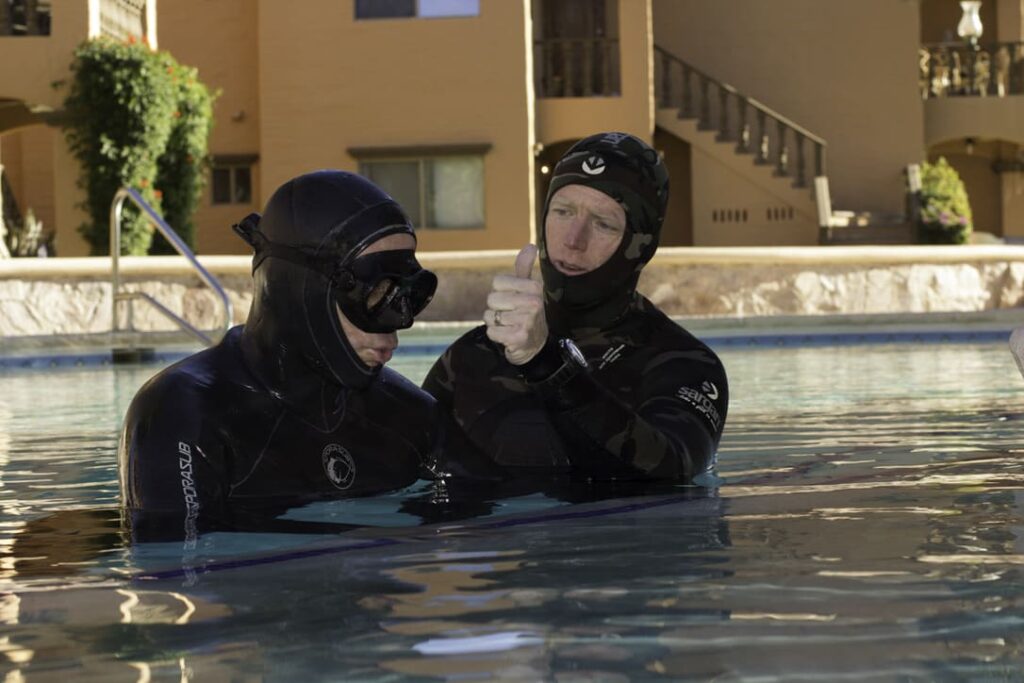
Scuba Risks vs. Freediving Risks
Risk factors might sway you toward one type of diving over the other.
- Scuba Risks: Decompression illness is the biggest risk to scuba divers. Nitrogen buildup in your body can make it hazardous for you to make a quick ascent to the surface—which you might feel tempted to do if you suffer a catastrophic equipment failure, or if you get panicked by something underwater. These scenarios are rare, but divers must be prepared to safely manage them.
- Freediving Risks: A blackout is the biggest freediving risk. Blackouts happen when you run low on oxygen before you can get back to the surface. Freedivers usually mitigate this risk by diving in groups—there are usually one or two “spotters” available to lift you out of the water if you blackout.
Don’t let these risks scare you out of trying scuba diving or freediving. Remember: during your training, you’ll learn the property safety techniques to mitigate risk. Plus, when you’re just getting started in scuba or freediving, you’ll only dive at shallow depths, where emergency situations are far more manageable.
Should You Try Scuba or Freediving?
So what’s a better fit for you: scuba diving or freediving?
Let’s break down the Pros and Cons of each.
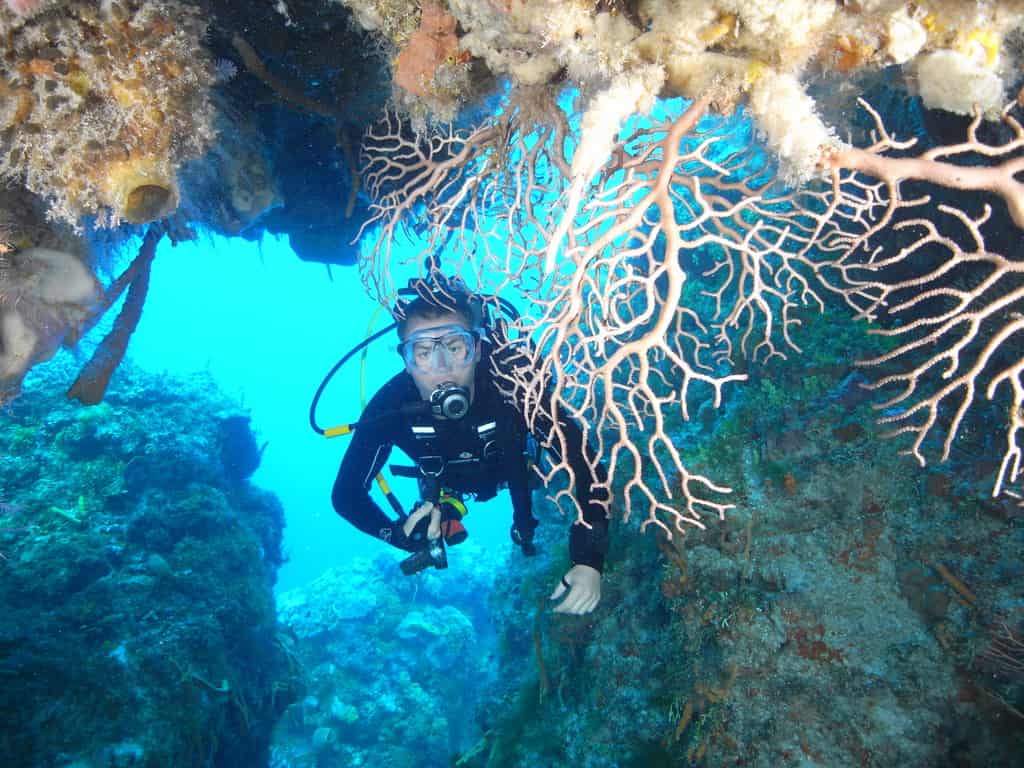
Scuba Diving Pros
- Longer Intervals: When you scuba dive, you’ll get to stay underwater for a longer period of time, which can make it easier to spot wildlife and bask in the splendor of whichever environment you’re exploring. This may also be optimal for underwater photography / videography.
- Deeper Depths: Scuba divers can dive deeper than freedivers can, especially if you get into technical diving—which can take you far deeper than 100 feet.
- Greater Dive Variety: The best thing about scuba diving is that there’s a huge variety of dive types. Scuba divers can enjoy drift diving, wreck diving, shark diving, propulsion diving, cave diving, and conservation diving (for instance, volunteering at a coral nursery). These types of dives require constant submersion, so they’re just not possible for freedivers. Scuba divers can also visit dive sites that are much harder—if not impossible—for freedivers to reach.
Scuba Diving Cons
- More Expensive: Scuba diving is a much more expensive sport, due to the variety of expensive equipment that you need to buy. A single boat dive will cost you quite a bit of money, and you may have to pay dive guides to lead you when you’re just getting started.
- More Planning: Scuba diving requires more planning than freediving. There’s a lot that needs to be done in advance of a dive: filling up cylinders, renting gear, reserving your spot on the boat, etc. You also need to be mindful of nitrogen buildup in your body, because this may affect how many dives you do, how deep you dive, and when you’re able to hop on a plane—which makes vacation planning more difficult, too. Few scuba divers go diving on a whim.
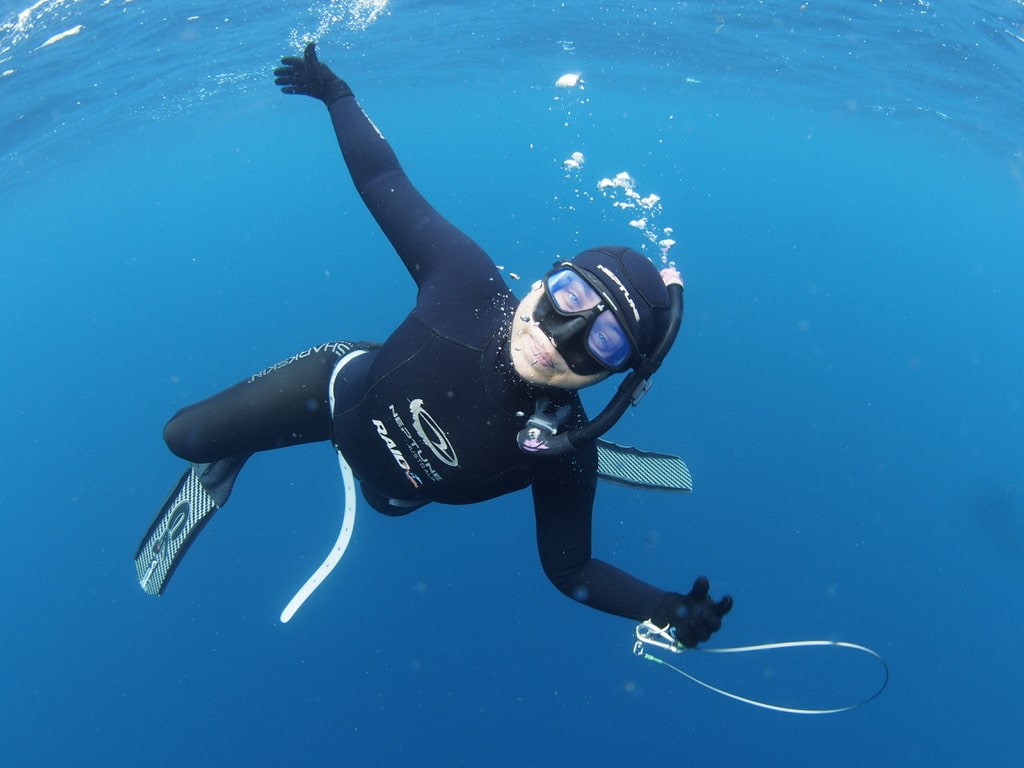
Freediving Pros
- More Affordable: Freediving is much more affordable than scuba diving because there’s less equipment, and the equipment isn’t so complicated or expensive. That’s one of the reasons why freediving is one of the fastest-growing watersports in the world.
- Greater Flexibility: Unlike scuba diving, freediving does not require much-advanced preparation. You can go freediving anytime you feel like it. Slip into your wetsuit, grab your mask and fins, and get into the water. It’s that easy.
- “Natural” Exploration: Freedivers appreciate not being strapped with heavy equipment, or using a breathing device. Apnea is a more “natural” way to explore the marine world. Some marine animals are frightened by the loud noise and bubbles that scuba divers make–freedivers can explore much more quietly and sometimes get better wildlife encounters.
- Can Express Yourself Better: Freediving gear tends to come in a larger variety of colors and styles, so you can have more fun expressing yourself. Freedivers also tend to look more glamorous in photos and videos. We think that counts for something!
Freediving Cons
- Less Variety: There are some types of diving, like drift diving, which aren’t suitable for freediving. Deep penetration of wrecks and caves is more safely done when you’re breathing on scuba.
Choosing Between Scuba Diving and Freediving…
So, now that we’ve gone over the pros and cons of scuba and freediving… which should you get certified for?
BOTH!
You should try scuba diving and freediving because both watersports complement one another. In fact, many scuba divers learn how to freedive, and many freedivers learn how to scuba dive.
These multi-certified divers are able to enjoy the perks that come with each water sport–the total immersion of scuba diving, and the meditative qualities of freediving.
If you’re trying to figure out which one to learn first, choose the one that you feel most comfortable with or the one that intrigues you most. Consider the gear, risks, and skills involved, and try whichever one peaks your curiosity the most.
